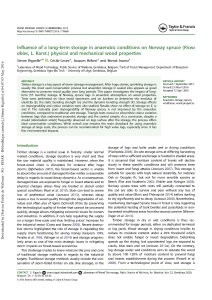Riguelle S., Lesire C., Hébert J., Jourez B.
Timber storage is a key aspect of storm damage management. After huge storms, sprinkling storage is usually the most used conservation process but anaerobic storage in sealed silos appears as good alternative to preserve wood quality over long periods. This paper investigates the impact of longterm (57 months) storage of Norway spruce logs in anaerobic atmosphere on wood properties. Tests were performed on clear wood specimens and on lumbers to determine the modulus of elasticity (E), the static bending strength (σf) and the dynamic bending strength (K). Storage effects on impregnability and colour variation were also studied. Results show no effect of storage on E, σf and K. The naturally poor impregnability of Norway spruce is not improved by the anaerobic conditions, compared to traditional wet storage. Triangle tests reveal no discernible colour variation between logs that underwent anaerobic storage and the control sample. As a conclusion, despite a mould (Gliocladium solani) frequently observed on logs surface after the storage, the process offers ideal conservation conditions. While overall cost remains the main drawback for using anaerobic storage at large scale, the process can be recommended for high value logs, especially since it has few environmental impacts.

